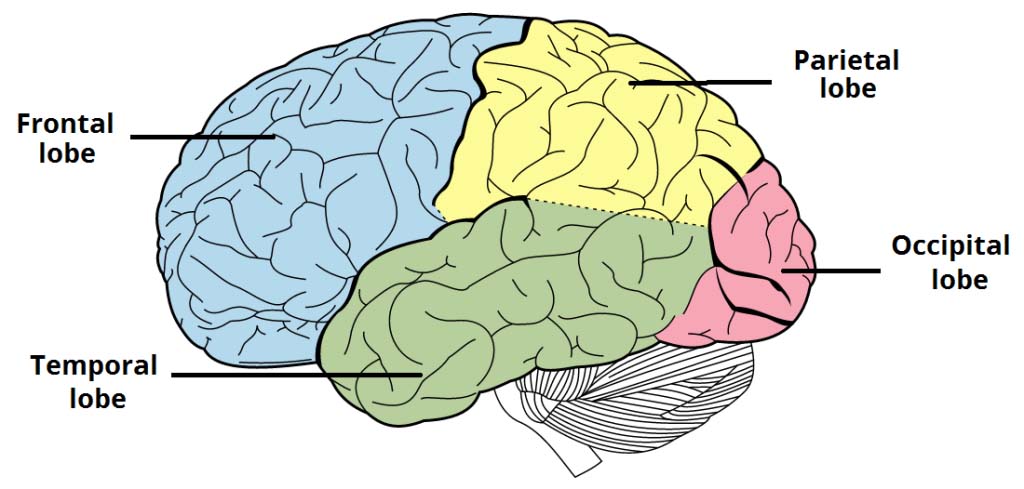Headache
Headache is one of the most common symptoms, about 50% of brain tumor patients experience headaches related to their tumor. The pain is due to pressure on blood vessels and nerves caused by the tumor. The brain itself doesn't have pain receptors.
Typical features of a headache caused by brain tumors are:
- Permanent headache
- Pain in the morning (that slowly gets better)
- Sickness
- Throbbing headache
- Sensitivity to movement (coughing, exercise..)
- Sometimes no response to the usual headache medication [1][2]
Seizures
Seizures are also a common symptom among patients with brain tumors (about 60% of patients at least once experience a seizure). A seizure is an episode caused by abnormal electrical activity in the brain, leading to unusual movement, loss of bodily functions and eventually loss of consciousness. The reaction depends on where the electrical pulses appear. Typically such an episode has a duration of 2-3 minutes and might include short periods of apnea (stopped breathing).
Seizures are often the first symptom leading to a brain tumor diagnosis. [1][2]
Loss of memory
Brain tumors, as well as the treatment (radiation therapy/chemotherapy/neurosurgery), can affect the short- and long-term memory. The effects and their severity differ from person to person.
The frontal lobe and the temporal lobe are particularly involved in memory. Thus patients with tumors located in these areas are more likely to have memory impairment.
Radiation therapy, chemotherapy and neurosurgery may affect cognition in general, which involves memory (in neurosurgery for example due to swelling). These effects may last for weeks or even months. [1][2]
Mood swings and cognitive changes
Brain tumors can affect thinking in general. The effects range from learning difficulties to problems in communication and even changes of character. Not only the physical, but also the emotional impact can lead to changes in mood and personality. More than half of all brain tumor patients suffer from cognitive changes.
Brain tumors tend to affect mental abilities like attention, multitasking, judgement, understanding, learning, reading, speaking (mixing up words, saying things with little sense), decision making and problem solving. The task affected mostly depends on where the tumor is located. The pace of thinking and reaction speed might decrease.
The frontal lobe is responsible for movement, intelligence, behavior, memory, personality, planning, judgement, initiative and mood.
A tumor in the temporal lobe can affect speech, behavior, memory, hearing, vision and emotions.
The parietal lobe is the area of reasoning, telling right from left, language, reading and intelligence.
No matter in what lobe the tumor is located, it can have effects on cognitive functions that are linked to another area of the brain. [1][2]
figure: Lobes of a brain. [4]
Loss of motion control, hearing or vision
Brain tumors can not only affect the mental abilities but also the quality of sensing. Changes in vision can include seeing blurring and flashing lights. Hearing disturbances such as ringing in the ears or even loss of hearing occur (on one or both sides).
Brain tumor patients can experience loss of motion control, e.g. weakness on one side of the body, losing balance, stumbling or walking into walls. They might start walking abnormally and have difficulties with precise movements.
Speech can also be affected by a brain tumor, resulting in slurring of the words or slow speech. [3]
Depression
Unlike 'normal' sadness, major depression is an illness and can interfere with the patient's daily life. Loss of interest, inactivity, insomnia and persistent feelings of sadness and worthlessness are symptoms of depression.
Depression can be caused by the tumor (pressure in areas that regulate mood), neurosurgery or the loss of the previous lifestyle due to the brain tumor diagnosis.
Depression is a very unspecific symptom for brain tumors, as there is no significant difference between a depression induced by a tumor and by other emotional causes. [1][2]
Fatigue
Fatigue due to a tumor or as a side effect of the treatment is more than just being tired. Patients feel completely exhausted and weak, with a profound lack of energy. It may also lead to an inability to concentrate, irritability, over-sleeping or, ironically, sleeplessness. Tumor-related fatigue is not relieved by resting or sleep.
The exact cause of fatigue is not known. One reason might be that fighting the tumor exhausts the body. Destruction of tumor cells and the repairing of tissue requires much energy. Also the treatment can be the cause of fatigue as the body needs to divert energy to repair changes in body chemistry or damage to healthy tissue. [1][2]
Bibliography
1) Brain Tumor Symptoms (inter alia), http://www.abta.org (access 13/05/17)
2) Brain tumour symptoms in adults (inter alia), www.thebraintumourcharity.org (access 13/05/17)
3) Brain Tumor Symptoms (inter alia), http://braintumoralliance.org (access 13/05/17)
4) Teach me anatomy, http://teachmeanatomy.info/ (access 13/05/17)
